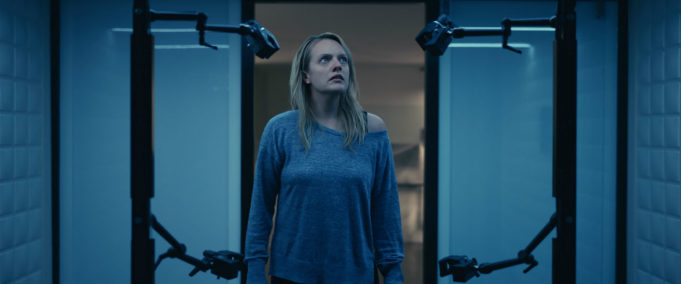In 1932, Rouben Mamoulian adapted Dr. Jekyll and Mr. Hyde into a film. Robert Louis Stevenson’s science-fiction novel had already been made into at least nine movies, but Mamoulian’s version was the first one with sound. He turned it into a meditation on domestic abuse, playing up Hyde’s violent sexuality and making a music-hall singer played by Miriam Hopkins into his victim, terrorized time and again until she became paranoid, convinced that whatever she did, he would find her again. That was the best movie I ever saw about domestic violence, until I saw The Invisible Man in theaters this week. No surprise that these two movies are both horror films, as the genre is perfect for conveying what kind of hell this is. You wonder why more horror filmmakers haven’t thought of this.
Not based on the H.G. Wells story by this name — or the Ralph Ellison novel, for that matter — the film is set in the present day, and begins with Cecilia Kass (Elisabeth Moss) sneaking out of the futuristic mansion overlooking the Pacific belonging to her husband Adrian (Oliver Jackson-Cohen). She takes the precaution of sedating him with diazepam, and he still almost catches her fleeing. Two weeks later, while she’s hiding out in Oakland with James (Aldis Hodge), a childhood friend who’s also a cop, she’s informed that Adrian has killed himself, leaving her $5 million of his fortune. It feels wrenchingly correct that the news brings her so little comfort. Prescient, too, because in short order, things around the house start disappearing. Something pulls the covers off her in bed, and when she tries to pull it back, she encounters resistance. People around her start fearing for her sanity when she says that Adrian is still alive and has found a way to make himself invisible.
This movie’s stroke of genius is taking a familiar nightmare and making it unimaginably worse with a simple twist. Astonishingly, this is the work of Leigh Whannell, the actor and writer from the Saw movies, and it shows a level of psychological subtlety that hasn’t been in any of his previous work. He makes us scared of Adrian before we ever meet the character, a tech mogul who specializes in digital optics — oh, that’s a clever touch — and has surveillance cameras installed all over his house so he can keep track of Cecilia’s every move. I am impressed and terrified by that level of commitment to controlling one’s wife. Adrian cuts his wife off from her friends, like so many abusers, by making her look like the perpetrator of all his misdeeds, from sending a hateful email message to her sister (Harriet Dyer) to beating up James’ teenage daughter (Storm Reid). The invisibility is a keen metaphor for how Cecilia is still in her husband’s grip even though he seems to be gone.
The character work is complemented by a creative visual stratagem, as Whannell on numerous occasions films Cecilia staring directly into the camera as she tries to determine whether someone is in front of her. We’re left staring at the background of the picture looking for evidence of the invisible man. I think Whannell could have played more with the possibility that Cecilia is losing her mind, but it’s nice that when she finally corners Adrian and gives him a powerful incentive to confess to all the beatings that he’s given her, he still denies everything, which what abusive men do when they’re caught.
Most of the horror in this film simply comes from Moss, whose fear and desperation for anyone to believe her story electrifies every particle of this film. Even in a boardroom scene, you see the panic setting in when Adrian’s brother and attorney (Michael Dorman) reads a statement from him. When she first advances her theory of Adrian’s invisibility, she seems just this side of unhinged. These are cut by the glints of joy and vindication when she thinks she has proof of her theory, or when she finally unloads on that brother and tells him exactly what she thinks of him. Then there’s the intelligence working overtime even as Cecilia’s taken to a psych ward, where Adrian follows her, and she tries to think of a plan to draw him out. I do think a minor tweak at the end could have turned The Invisible Man into a full-fledged masterpiece, but I’ll still take this movie over a thousand clinical, realistic, carefully observed films on the same subject. This is the most powerful movie about domestic abuse in the last 88 years. We should act accordingly.
Starring Elisabeth Moss and Aldis Hodge. Written and directed by Leigh Whannell. Rated R.












